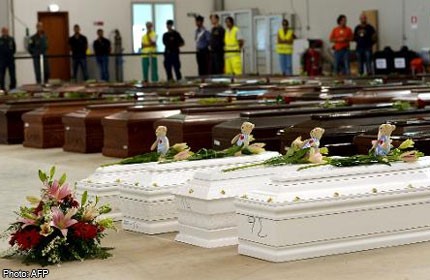Divers resume Italy refugee shipwreck search

LAMPEDUSA, Italy - Divers in Italy resumed the grim search for bodies Sunday after a shipwreck in which over 300 African refugees are feared to have died, as a government minister called for an easing of tough immigration rules.
Integration Minister Cecile Kyenge said she planned to triple the available accommodation in asylum centres to cope with the growing influx of illegal immigrants flocking to Europe, often on treacherous sea voyages.
The operation to recover more bodies from the wreck on top of the 111 already found had been suspended since Friday because of rough seas off the remote island of Lampedusa where Thursday's tragedy unfolded.
Fire brigade, navy, border patrol, coast guard and police divers were all taking part, limiting their dives to six or seven minutes because the wreck is on the seabed at a depth of 47 metres (154 feet).
"The search has resumed," Leonardo Ricci, a spokesman for the emergency services, told AFP.
There is a plan to raise the corpse-filled wreck, which is less than a kilometre (about half a mile) from the shore of the remote outcrop, Italy's southernmost territory and a major entry point for illegal migrants entering the European Union.
Kyenge, who visited the island on Sunday, said the current 8,000 spaces for refugees in Italy had to increase.
"I am planning to bring the number of bed spaces first to 16,000 and then to 24,000," said Kyenge.
She also called for reform of an immigration law that considers all irregular migrants suspects in the crime of "clandestinity" and punishes anyone accused of facilitating their landings.
"The law on immigration cannot be punitive. The migratory flux has fundamentally changed. We have to understand it and change our laws," she said.
Kyenge, who has faced racist abuse as Italy's first black minister, said that previously most of the arrivals were economic migrants, but that now they were mostly refugees fleeing war and persecution.
French Prime Minister Jean-Marc Ayrault has called for a meeting of European countries on border management following the tragic shipwreck.
Italy has requested that the refugee influx be put on the agenda of a meeting of European interior ministers in Luxembourg on Tuesday and of a summit of EU leaders at the end of the month.
European Affairs Minister Enzo Moavero said there was an "unjustifiable asymmetry" between the mobilisation of EU states in the economic crisis and the lack of coordination over immigration.
European Commission president Jose Manuel Barroso is due to visit Lampedusa on Wednesday, Italian Prime Minister Enrico Letta announced.
On the island itself, local authorities struggled to cope with the new arrivals. Lampedusa's refugee centre has 250 places but is now housing more than 1,000 people including those from previous landings.
Many have been forced to sleep outside.
'Constant emergency'
Forty of the 155 survivors - unaccompanied minors aged between 11 and 17 - are among those living in squalor in the heavily-guarded centre awaiting transfer to mainland Italy in the coming days.
Italy has seen 30,000 asylum-seekers arrive so far this year - more than four times the number for last year. Most of the arrivals land on Lampedusa, which is closer to north Africa than to Italy.
Hundreds have perished at sea, adding to the estimated 17,000 to 20,000 who have died crossing the Mediterranean over the past 20 years.
"There is no plan for the landings. There is just a constant emergency," said Francesco Rocca, the president of the Italian Red Cross.
Rocca joined calls for "humanitarian corridors" that could allow people needing international protection to travel to Europe more easily.
Survivors on Saturday cried over the coffins of their loved ones as the Italian coast guard denied claims that the rescue operation was badly delayed.
Local fishermen - many of whom rushed to the rescue - also laid a wreath of flowers at sea on Saturday in a poignant homage to the drowned.
Officials say that the survivors have asked for the bodies repatriated to Eritrea, the African dictatorship they were fleeing.
The best estimates for how many people were on board the vessel when it caught fire and sank range between 480 and 518 people, which would give a final death toll of between 325 and 363 people.
It is feared some of the bodies may be lost at sea forever because of strong currents in the area.
The boat had departed from Libya and survivors said they had lit a small fire on board to attract coast guards after they began taking on water but the fire spread, sparking panic on board.